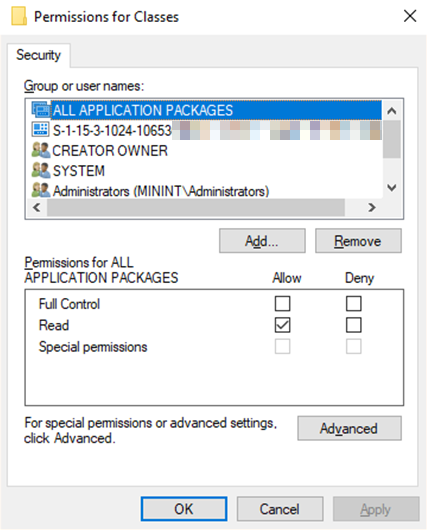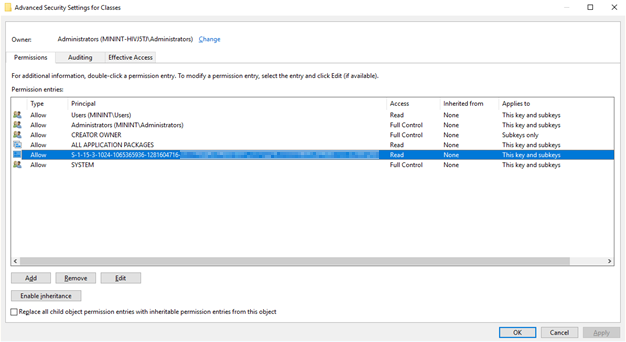Note
Access to this page requires authorization. You can try signing in or changing directories.
Access to this page requires authorization. You can try changing directories.
This article provides some information about the issue where some security identifiers (SIDs) don't resolve into friendly names.
Original KB number: 4502539
Symptoms
In some places in the Windows User Interface, you might see Windows account Security Identifiers (SIDs) that don't resolve to friendly names. These places include the following:
File Explorer
Security Audit reports
The access control list (ACL) editor in Registry Editor, as shown in the following examples:


Cause
Windows Server 2012 and Windows 8 introduced a type of SID that is known as a Capability SID. By design, a Capability SID doesn't resolve to a friendly name.
Capability SIDs uniquely and immutably identify capabilities. In this context, a capability is an unforgeable token of authority that grants a Windows component or a Universal Windows Application access to a resource such as documents, cameras, locations, and so forth. An application that "has" a capability is granted access to the resource that is associated with the capability. An application that "does not have" a capability is denied access to the associated resource.
The most commonly used Capability SID is:
S-1-15-3-1024-1065365936-1281604716-3511738428-1654721687-432734479-3232135806-4053264122-3456934681
Windows 10, version 1809 uses more than 300 Capability SIDs.
More information
Important
Don't delete Capability SIDs from either the registry or file system permissions. Removing a Capability SID from file system permissions or registry permissions might cause a feature or application to function incorrectly. After you remove a Capability SID, you cannot use the UI to add it back.
When you're troubleshooting an unresolved SID, make sure that it isn't a Capability SID. To get a list of all of the Capability SIDs, follow these steps:
Select Start > Run, and then enter regedt32.exe.
Navigate to the following registry entry:
HKEY_LOCAL_MACHINE\SOFTWARE\Microsoft\SecurityManager\CapabilityClasses\AllCachedCapabilities.Copy the value data and paste it into a text file (or a similar location where you can search the data).
Note
This value might not include all Capability SIDs that third-party applications use.
Search the data for the SID that you're troubleshooting.
- If you find the SID in the registry data from the preceding step, then it's a Capability SID. By design, it will not resolve into a friendly name.
- If you don't find the SID in the registry data, then it isn't a known Capability SID. You can continue to troubleshoot it as a normal unresolved SID. Keep in mind that there's a small chance that the SID could be a third-party Capability SID, in which case it will not resolve into a friendly name.